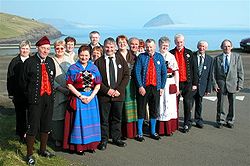Faroese people

|
|

Faroese folk dancers, in national costumes.
|
|
| Total population | |
|---|---|
| (c. 70,000) | |
| Regions with significant populations | |
|
|
≈50,000 |
|
|
21,687 |
|
|
1,981 |
|
|
500 |
| Languages | |
| Related languages include Icelandic, Norwegian, Danish and to a lesser extent, all Germanic languages, with some influence coming from Irish. | |
| Religion | |
|
Lutheran Church of the Faroe Islands Historically Norse religion and Celtic Christianity (- 1000) and Catholicism (1000 ~ 1538) |
|
| Related ethnic groups | |
|
Icelanders, Norwegians, Danes, English, Shetlanders, Orcadians, Irish, Scottish, Swedes Other Germanic peoples or Celts |
|
Faroese people (Faroese: Føroyingar) are a Germanic ethnic group and nation native to the Faroe Islands. The Faroese are of mixed Norse and Gaelic origins. About 21,000 Faroese live in neighbouring countries, particularly in Denmark, Iceland and Norway. Most Faroese are citizens of the Kingdom of Denmark, in which, The Faroe Islands are a constituent nation. The Faroese language is one of the North Germanic languages and is closely related to Icelandic and to western Norwegian varieties.
The first known colonists were Gaelic hermits and monks who arrived in the 6th century.
Later from around 650 the Norse-Gaels came and brought Norse culture and language to the islands. Little is known about this period, thus giving room for speculation. A single source mentions early settlement, the Icelandic Færeyinga saga. It was written sometime around 1200, and explains events taking place approximately 300 years prior. According to the saga, many Norsemen objected to the Norwegian king's unification politics and thus fled to other countries, including the newfound places in the west.
Historians have understood since the time of the Færeyinga saga that the Viking Grímur Kamban was the first settler in the Faroes. The Norwegians must have known about the isles before leaving Norway. If Grímur Kamban had settled some time earlier, this could explain the Norwegians knowing about them. Another, more logical explanation might be that the Norwegians came to know about the islands by the Gaels of Scotland and Ireland.
...
Wikipedia
